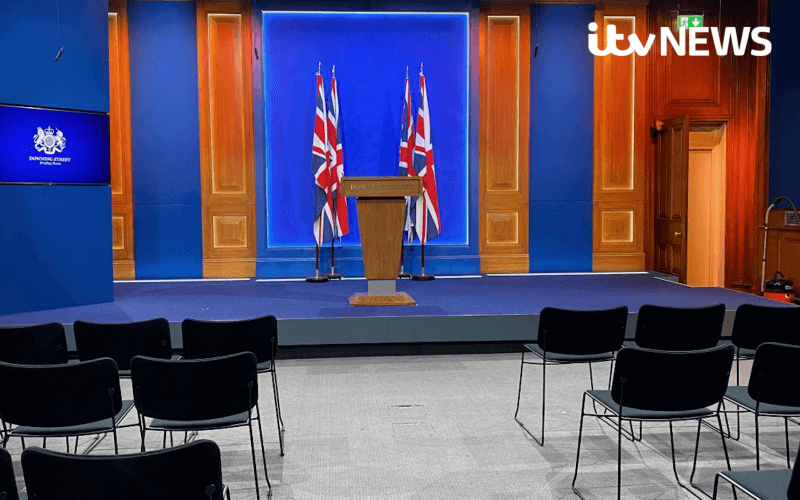The prime minister’s office has admitted that it made no attempt to ensure that a new £2.6 million Downing Street media briefing room would be accessible to disabled people.
Disability News Service (DNS) revealed last month that the platform in the room was not step-free and that civil servants or ministers with a mobility impairment would have to use a removable ramp if they wanted to address the media.
It later emerged that the prime minister and his team of civil servants had also failed to ensure that the facilities would allow an on-platform British Sign Language (BSL) interpreter.
Now the Cabinet Office has admitted – in response to a DNS freedom of information request – that it has no record of any discussions about the accessibility of the new facility (pictured) in the 12 months leading up to its unveiling.
It also admits in its response that it has no record of seeking advice on the plans from any access experts.
Instead, it left this work to its contractors, who it claims “have ensured that the relevant provisions in building regulations on access were followed”.
Baroness [Sal] Brinton, former president of the Liberal Democrats and herself a wheelchair-user, said last month that the access at the briefing room was “an absolute disgrace” and “a practical demonstration of the barriers to the most senior political offices in this country”.
The crossbench peer Baroness [Jane] Campbell, another wheelchair-user, said last month that the failure “sends out a clear message that, yet again, disability access is an afterthought”.
The failure to consider access comes despite the prime minister, Boris Johnson, finding himself at the centre of three separate legal actions relating to his continuing failure to provide on-platform BSL interpreters at vital televised briefings on the pandemic.
Deaf viewers first began to raise concerns about the lack of an interpreter in March 2020, a year before the media briefing room was used publicly for the first time.
Lynn Stewart-Taylor, founder of the #WhereIsTheInterpreter campaign, who has been trying for the last year to persuade the government that it must provide an on-platform interpreter at its pandemic briefings, and not rely on an in-screen interpreter on the BBC News channel, said she was disappointed but not surprised by the prime minister’s latest failure.
She said: “The fact is, broadcasting with a live on-platform interpreter saves money because only one camera is required and fewer technicians.
“In addition, it guarantees that the broadcasts are transmitted across every media channel.
“Clearly, the government is taking away access to reduce diversity, hide and segregate deaf sign language people.
“It’s very clear that sign language people are excluded from society. Our community is highly marginalised, under-represented, and under-researched.
“The government has failed us big time.”
Vicky Foxcroft, Labour’s shadow minister for disabled people, said: “The findings from this FoI are yet another example of how disabled people continue to be afterthoughts by the Conservatives.
“The prime minister has been asked several times why his press conferences remain inaccessible, his continued failure to answer is completely unacceptable.
“If the government want to get serious about making disabled people’s lives better, important press briefings with safety information should be accessible for all.
“Disabled people have had enough of feeling like an afterthought.”
The freedom of information response says that access to the briefing room is through a Whitehall building which has step-free access and accessible toilets, while “reasonable adjustments have been made to the briefing room itself, including incorporating a removable ramp into the design”.
It also says that government officials have worked with the BBC to ensure there is BSL interpretation for televised No 10 coronavirus press conferences, while the Cabinet Office has access to a BSL interpreter, based in a separate studio, for use on its social media channels, a resource which is made “freely available to key broadcasters”.
A spokesperson for No 10 declined yesterday (Wednesday) to comment on the freedom of information response.
Picture courtesy of ITN/ITV News
A note from the editor:
Please consider making a voluntary financial contribution to support the work of DNS and allow it to continue producing independent, carefully-researched news stories that focus on the lives and rights of disabled people and their user-led organisations.
Please do not contribute if you cannot afford to do so, and please note that DNS is not a charity. It is run and owned by disabled journalist John Pring and has been from its launch in April 2009.
Thank you for anything you can do to support the work of DNS…

 Abuse of disabled supporters at live sports events is growing problem, survey finds
Abuse of disabled supporters at live sports events is growing problem, survey finds DWP told to pay £50,000 to Deaf job-seeker after repeated failure to provide BSL interpreter
DWP told to pay £50,000 to Deaf job-seeker after repeated failure to provide BSL interpreter One in 10 disabled people left in debt for first time by cost-of-living crisis, says survey
One in 10 disabled people left in debt for first time by cost-of-living crisis, says survey